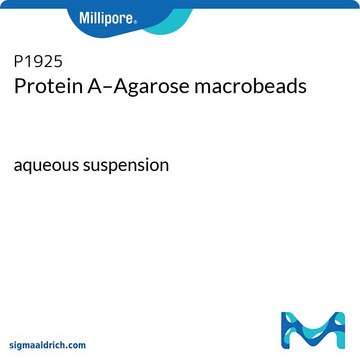P7700
Protein G–Agarose
lyophilized powder, Contains lactose stabilizers that must be removed prior to use.
Synonym(s):
Protein G resin
Sign Into View Organizational & Contract Pricing
All Photos(3)
About This Item
Recommended Products
Quality Level
form
lyophilized powder
matrix
cross-linked 4% beaded agarose
matrix activation
cyanogen bromide
matrix attachment
amino
matrix spacer
1 atom
capacity
≥15 mg/mL binding capacity (human IgG)
storage temp.
−20°C
Application
Protein G-agarose is used in affinity chromatography, protein chromatography, antibody purification and characterization, immunoaffinity matrices, protein A, G and L resins, and purification and detection. Protein G-agarose has been used to study breast cancer and falsely elevated thyroid-stimulating hormone (TSH).
Preparation Note
Prepared with a genetically engineered Protein G which retains its high affinity for IgG and lacks albumin and Fab binding sites and membrane binding regions.
Storage Class Code
11 - Combustible Solids
WGK
WGK 3
Flash Point(F)
Not applicable
Flash Point(C)
Not applicable
Personal Protective Equipment
dust mask type N95 (US), Eyeshields, Gloves
Choose from one of the most recent versions:
Already Own This Product?
Find documentation for the products that you have recently purchased in the Document Library.
Customers Also Viewed
Hiroshi Hirai et al.
Investigational new drugs, 29(4), 534-543 (2010-01-20)
Deregulation of cell-cycle control is a hallmark of cancer. Thus, cyclin-dependent kinases (Cdks) are an attractive target for the development of anti-cancer drugs. Here, we report the biological characterization of a highly potent pan-Cdk inhibitor with a macrocycle-quinoxalinone structure. Compound
C Wang et al.
Blood, 85(9), 2570-2578 (1995-05-01)
The activity of hemolytically inactive C5b67, designated iC5b67, was evaluated as an agonist for functional responses of human polymorphonuclear leukocytes (PMN). C5b67 was formed from purified human complement components and decayed in phosphate-buffered saline (PBS) until it had no lytic
J W Priest et al.
Molecular and biochemical parasitology, 113(1), 117-126 (2001-03-20)
Cryptosporidium parvum is a protozoan parasite of the intestinal epithelium that has caused numerous outbreaks of diarrheal illness in humans. During our studies of the host immune response to C. parvum infection, we noted that two of the immunodominant surface
John Collins et al.
Liver, 22(6), 501-506 (2002-11-26)
Persistent elevation of aspartate aminotransferase (AST) activity in serum due to the presence of a macroenzyme form of AST (macro-AST) may lead to diagnostic confusion in many clinical conditions, particularly those associated with chronic liver disease. We describe a case
Our team of scientists has experience in all areas of research including Life Science, Material Science, Chemical Synthesis, Chromatography, Analytical and many others.
Contact Technical Service










